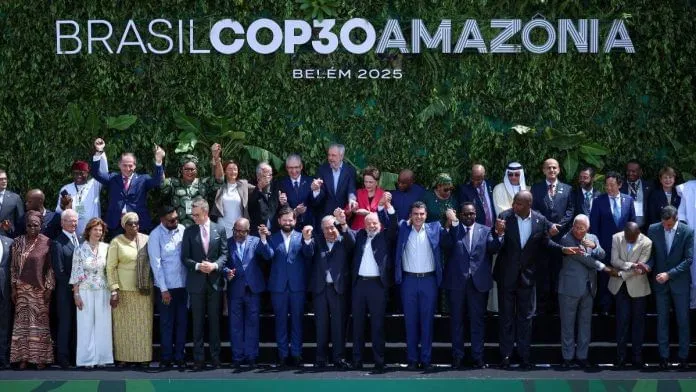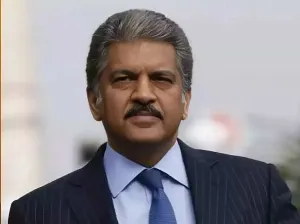Over 1,600 Fossil Fuel Lobbyists Attend COP30 in Brazil

New Delhi: The 30th Conference of the Parties (COP30) to the United Nations Framework Convention on Climate Change (UNFCCC) in Brazil is witnessing unprecedented participation from fossil fuel lobbyists, with more than 1,600 representatives in attendance. This figure marks the highest proportion of industry lobbyists compared to other delegates in the history of these annual conferences, according to the climate advocacy coalition Kick Big Polluters Out (KBPO), which consists of over 450 organisations advocating for stringent regulations on climate action.
The presence of fossil fuel lobbyists is particularly notable as they outnumber delegations from all countries, except for Brazil, the host nation of the conference. Rachel Rose Jackson, coordinator of KBPO, expressed her concerns regarding the influence of these lobbyists: "The number of fossil fuel lobbyists present at this conference makes it very clear whose voices are being heard, whose aren’t, who is in control of power and who is given access to make decisions on climate issues."
As global leaders convene in Belém, Brazil, to discuss pressing matters such as climate finance, adaptation strategies, and emission reduction from fossil fuels, the overwhelming presence of industry representatives raises questions about the integrity of the negotiations. This year's COP30 is particularly significant as it takes place in the Amazon rainforest, an area crucial for global biodiversity and climate stability. However, only about 900 delegates representing indigenous communities from various regions are participating in the conference.
On the opening day, members of the Munduruku indigenous group staged a demonstration outside the conference venue, calling for an end to extractive development projects in the Amazon, as reported by Reuters. This protest highlights the stark contrast between the voices of those directly affected by climate change and the fossil fuel lobbyists present at the summit.
The presence of fossil fuel lobbyists at COPs is not a new phenomenon; last year, over 1,700 lobbyists attended the conference held in Azerbaijan, and the previous COP in Dubai saw more than 2,400 fossil fuel delegates. However, the proportion of lobbyists to other delegates at COP30 has reached an all-time high. According to KBPO, the number of fossil fuel lobbyists attending this year represents a 12% increase compared to the previous summit.
Jax Bongon, a delegate from the Philippines and member of KBPO, highlighted the disparities faced by countries most vulnerable to climate change. "Right now, back home in the Philippines, we’re still reeling from typhoon after typhoon. Unprecedented floods, many lives lost and still missing," Bongon stated. He further pointed out that the Philippines has 1,600 fossil fuel lobbyists outnumbering its delegates by a ratio of 50 to 1, which he described as a stark and unsettling contrast.
The ten countries identified as most vulnerable to climate change—including Chad, Niger, and the Solomon Islands—collectively do not have as many delegates as fossil fuel lobbyists at the conference. This imbalance raises concerns about the priorities of climate negotiations and the potential conflicts of interest involved.
Fossil fuel lobbyists have also secured positions within official country delegations, including those from France, Norway, and Japan. Members of major oil and gas corporations, such as ExxonMobil, British Petroleum, and TotalEnergies, comprise a significant portion of these delegates. Their presence has prompted alarm regarding the potential conflicts of interest that could arise during negotiations focused on reducing fossil fuel dependency.
An analysis conducted by the Indian think-tank Sustainable Futures Collaborative noted that the influence of fossil fuel lobbyists has contributed to the ongoing failures of climate negotiations. "This tendency towards inadequate and unmet promises has been an ongoing feature of climate multilateralism. It can be attributed to weak enforcement by the UNFCCC, under-represented Global South, and vested interests and lobbying by the fossil fuel industry," the analysis stated.
The KBPO has documented the attendance of over 5,000 fossil fuel lobbyists at COPs from 2021 to 2024, emphasising that these companies have invested more than $35 billion in new oil and gas fields during the same period. This continued investment raises questions about the commitment of the fossil fuel industry to addressing climate change, particularly in light of the criticisms directed at the UNFCCC for its inability to deliver on climate finance promises for developing countries.
Bongon concluded with a poignant statement, reflecting on the ongoing struggles faced by communities affected by climate change: "It’s infuriating to watch their influence deepen year after year, making a mockery of the process and of the communities suffering its consequences." The presence of fossil fuel lobbyists at COP30 underscores the ongoing tension between industrial interests and the urgent need for effective climate action.

Bangladesh Seeks Extradition of Sheikh Hasina Following Death Sentence

Tom Cruise Receives Honorary Oscar at Governors Awards Ceremony

Anand Mahindra Highlights Skilled Worker Shortage in the US

Supreme Court Raises Concerns Over Liquor in Tetra Packs





